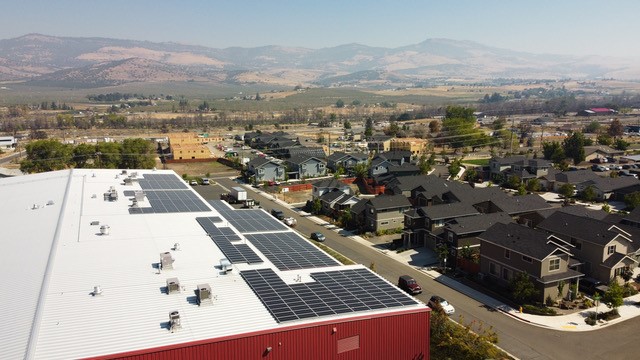Success Story
Solarize Rogue prepares to power up community solar
The first small community solar project approved in Oregon is also the only participant-owned project so far under a new state program that helps more people benefit from solar energy.
Launched in 2020, Oregon Community Solar Program is a great option for renters, people who live in multifamily buildings and those without a sunny roof of their own or the funds to invest in a standalone rooftop system. Community solar subscribers are credited through their electric bills for their portion of the energy generated.
In most cases, community solar projects are built by professional solar developers who sign up households as subscribers to a share of the project’s output. But in Southern Oregon, the grassroots group Solarize Rogue took a different approach by recruiting 16 households from across the Rogue Valley to help pay the upfront costs and act as both owners and participants in the project.
Since all community solar projects must reserve 10% of their capacity for low-income participants, the group also recruited three local households with low incomes to subscribe to the project. These customers will receive deeper savings on their energy bills through their subscriptions.
Solarize Rogue, a nonprofit created in 2017 to promote solar energy, saw the potential to serve more people through community solar.
“What we realized was the people who could afford to put solar panels on their roofs and had a good roof for solar panels probably already had installed solar panels. But that leaves behind a lot of people who don’t own roofs, don’t have the right roofs, don’t have the funds,” said Ray Sanchez-Pescador, president of Solarize Rogue.
Solarize Rogue partnered with another nonprofit, the Oregon Shakespeare Festival, to site the community solar project on the roof of its production building in Talent. After several months of planning and coordination with regulators and local utility Pacific Power, 362 solar panels were installed by Energy Trust trade ally True South Solar in August 2021. The expected first-year generation is more than 172,000 kilowatt hours.
Solarize Rogue received a $100,000 incentive from Energy Trust to help cover construction costs. This funding was meant to help serve customers traditionally underrepresented in public processes and solar incentive programs.
Energy Trust, which helps administer the Oregon Community Solar Program as a subcontractor, also offers incentives to help public or nonprofit organizations and developers of small-scale projects navigate the financial and technical hurdles of a typical community solar project and gain experience in developing community solar.
Photo credit: True South Solar
